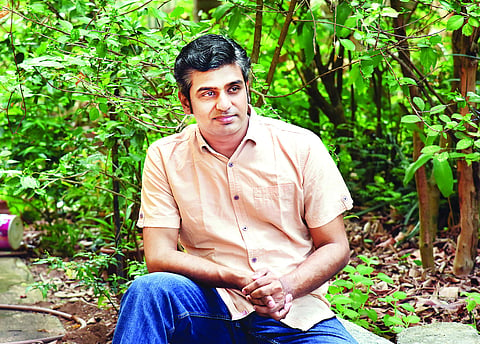

Stars, hide your fires; Let not light see my black and deep desires.”
― William Shakespeare, Macbeth
Can you imagine a world where man is devoid of ambition, desire and greed? A perfect world? If yes, then what you seek is utopia. And the desire for such a world is why Macbeth, Shakespeare's play from the 17th century, is relevant even today, in the 21st century. And this relevance explains why we're never tired of the classic and its numerous adaptations.
Film critics were awestruck when Vishal Bhardwaj retold the Shakespearean tragedy through Mumbai's underworld in Maqbool and when Jayaraj clubbed it with North Malabar's ballads, Vadakkan Pattukal in Veeram. Their admiration was no less when they watched Abhaya Simha's Paddayi, a film that sees Macbeth reborn in a Tulu-speaking Mangalorean coastal town.
The 2018 film was screened at the Bengaluru International Film Festival and received great reviews, and will soon be screening at the New York Film Festival.Earlier in April, the film won the 2018 National Film Award for Best Feature Film in Tulu.
Such accolades! But the award wasn't unexpected for Simha, who is an FTII graduate, neither is it new. His first feature film, Gubbachigalu (sparrows in Kannada), a story about two children who go in search of a sparrow in a city, had won the National Film Award for Best Children's Film in 2008. "I started my film career in 2007. That year, I moved to Bengaluru and began working on Gubbachigalu. Winning a National Award for that was a purely magical experience. I was elated," he says, adding, "The second award didn't make me any less happy, of course, but it wasn't a surprise. We were in it to win it."
The film's protagonists, Madhava and Sugandhi, are a young couple from a fishing community, the Mogaveera, whose lives are turned upside down owing to greed. After a strange prophecy comes true, things take a new turn in their lives and they find themselves trapped in a cobweb of problems. "Macbeth is all about desire and ambition, and the repercussions. That is universal. Man's greed has reached greater heights these days. Even though it was written four centuries ago, the emotions that the characters convey are still relevant.
And because of that, making Paddayi was an interesting challenge," says Simha. "This is a classic ‘travel through time’ without losing its relevance. That is what sets it apart," adds the 36-year-old. Turning Madhava and Sugandhi into Macbeth and Lady Macbeth wasn't very difficult for him, after all, "for any adaptation, if you stay true to the essence of the work, it isn't much of an effort," he states.
Simha originally wrote Paddayi's script for a competition by the British Council and had no intention of turning it into a full-length feature film. So, how did that change? He tells us the story. "The script for the competition was too mechanical. But the story was so powerful that it started haunting me and I started pursuing it as a feature film. I don't even know what happened to the competition," he laughs.
Simha tells us how growing up in Mangaluru influenced him as a storyteller and a filmmaker. "I was born and brought up in Mangaluru. Most of my stories are conceived here as my memories are associated with this place. Mangaluru and its surroundings are my first inspiration," he says. Even though he isn't a native Tulu speaker, he understands the language well.
But if the story of Macbeth has been retold so many times, then what makes this one so special? Well, Tulu has barely 2 million speakers across India (and 2 million isn't as big as you think when you've got a population of over 1 billion!). So, obviously, the Tulu film industry is also quite small. The market was definitely Simha's biggest challenge. "It is a very small community and that makes it tough to release the movie. There are only 12 theatres that screen Tulu films. The budget is very tiny and the equipment and other facilities are pretty limited too," he notes.
Despite the restrictions, he is happy to see more Tulu films coming up these days. "The situation is much better now. Around 20-25 films happen every year. A lot of people with money are now viewing this as a favourable market to invest in," he believes.
Between Gubbachigalu and Paddayi, Simha directed two more films — Shikari (a Malayalam-Kannada bilingual film) and Sakkare (a Kannada film). So, when we asked him to pick his favourite out of these four films, he didn't know which to choose. But ultimately, he had to choose one. "A filmmaker grows from film to film. Paddayi is my favourite right now because I'm just out of that experience. But this is only until something better comes up," he tells us. "Ten years down the line, if I look at Gubbachigalu, I'm sure I will find a 100 different ways I could've made that film. But at that age and time, that style suited my maturity level," he adds.
Since Paddayi retells Macbeth, elements of magical realism are inevitable. And that enhances its beauty, believes Simha, "Magical realism happens in most Shakespearean works and even though we can't translate all of it to Tulu, the moments we did adapt on screen through audio and visual elements made me very emotional.”
He also takes us back to the time when he shot Paddayi's version of the scene where Lady Macbeth sees blood on her hands and recalls how it haunted him for days. "The way that scene turned out mesmerised me. Right after that, everything started falling in place. In fact, we built the entire film around that," says Simha. An emotional story and the emotional process behind it makes Paddayi a story well retold.
